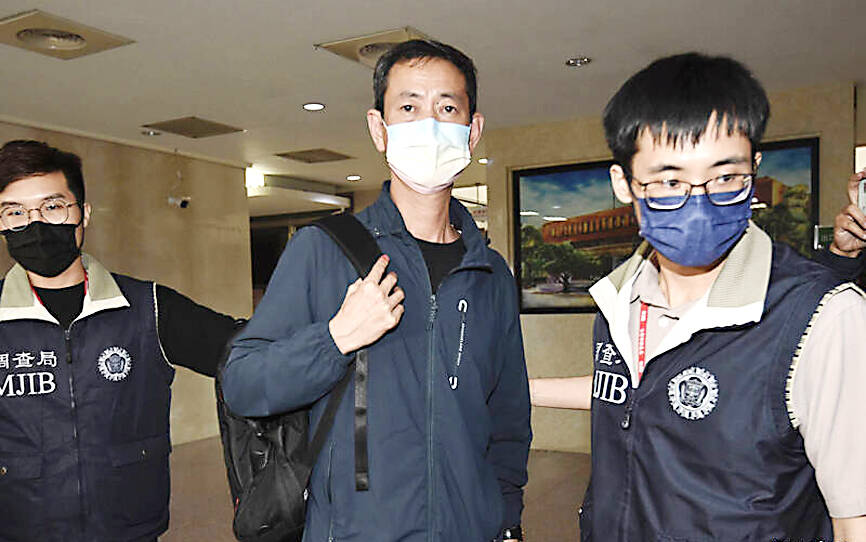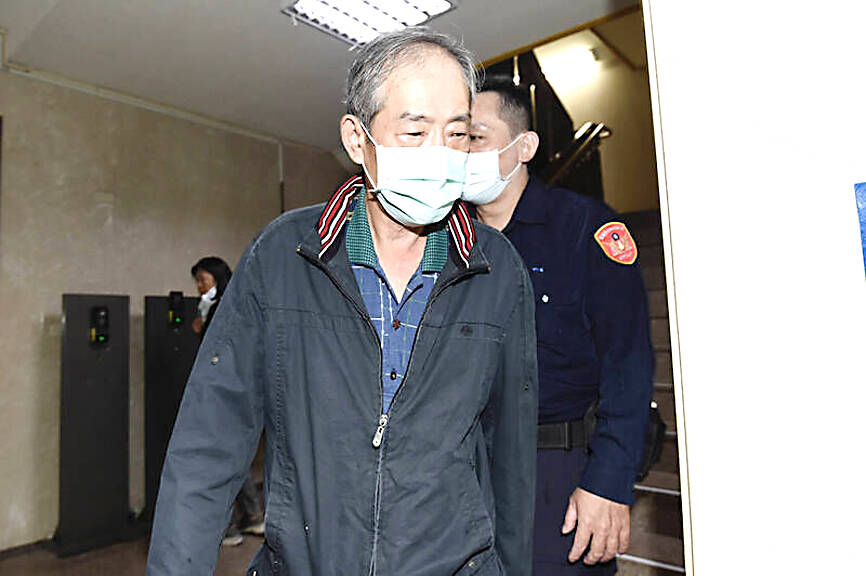Three people connected with China-funded organizations, including Chou Ke-chi (周克琦) who heads the Gong He Party (共和黨), were indicted yesterday for contravening the Anti-Infiltration Act (反滲透法).
Along with Chou, who also heads the pro-China agitation group 333 Political Alliance (333政黨聯盟), Pan Jindong (潘進東) and Chu Chun-yuan (朱俊源), board members of the Taipei Puxian Association (莆仙同鄉會), were also indicted. Puxian is another name for Putian, a city in China’s Fujian Province.
The three are the first people Taipei prosecutors have charged for contravening the Anti-Infiltration Act since it was passed by the legislature in 2020 to counter the influence of foreign hostile forces seeking to meddle in Taiwan’s elections.

Photo: Tsung Chang-chin, Taipei Times
Prosecutors said that an investigation found that Chou had received money from China to pay for him to organize activities against Taiwanese independence groups, denounce efforts to improve Taiwan-US relations and carry out targeted protests against the US National Endowment for Democracy during the World Movement for Democracy’s Global Assembly in Taipei in October last year.
Money from China also allegedly helped to fund the Gong He Party’s candidates for Taipei mayor and city councilor offices in the nine-in-one elections in November last year, prosecutors said.
Pan and Chu allegedly made frequent trips to China, including Putian, to channel money to Chou, prosecutors said.

Photo: Tsung Chang-chin, Taipei Times
The indictment said that Pan was born in China’s Fujian Province and immigrated to Taiwan in 2002 with family, later becoming a Taiwanese citizen.
In China, government officials allegedly invited Pan to serve as deputy director of the Putian Porcelain Arts Museum, which is funded and controlled by the city’s Taiwan Affairs Office, prosecutors said.
The office focuses on “united front” activities targeting Taiwanese businesspeople and students, and also allegedly provides money to conduct pro-China propaganda campaigns in Taiwan, they said.
Pan and Chu allegedly were charged with carrying out “united front” activities and fielding pro-China candidates for elected office, they said.
The pair allegedly provided Chou with NT$220,000 last year, which contravenes laws on registered political parties receiving funds from foreign sources, prosecutors said.
Chou allegedly used the money to make flags and print pamphlets for the Gong He Party, as well as to organize rallies to espouse Chinese political propaganda, they said.
He also allegedly used the money for campaigning for the party’s Taipei mayoral candidate, Tang hsin-min (唐新民), and those running for city councilor seats, they said.
Tang received 316 votes, or 0.02 percent, in the election, while the party’s councilor candidates received a combined 67 votes, data from the Central Election Commission showed.
Chou and Pan allegedly organized a protest outside the World Movement for Democracy’s Global Assembly last year, paying 65 people NT$200 to NT$250 to attend the demonstration, along with other expenses, prosecutors said.
Chou, Pan and Chu also allegedly collaborated to record and compile videos and briefs on their campaigns and protest activities, sending them to their Chinese handlers through WeChat, they said.

MAKING WAVES: China’s maritime militia could become a nontraditional threat in war, clogging up shipping lanes to prevent US or Japanese intervention, a report said About 1,900 Chinese ships flying flags of convenience and fishing vessels that participated in China’s military exercises around Taiwan last month and in January last year have been listed for monitoring, Coast Guard Administration (CGA) Deputy Director-General Hsieh Ching-chin (謝慶欽) said yesterday. Following amendments to the Commercial Port Act (商港法) and the Law of Ships (船舶法) last month, the CGA can designate possible berthing areas or deny ports of call for vessels suspected of loitering around areas where undersea cables can be accessed, Oceans Affairs Council Minister Kuan Bi-ling (管碧玲) said. The list of suspected ships, originally 300, had risen to about

DAREDEVIL: Honnold said it had always been a dream of his to climb Taipei 101, while a Netflix producer said the skyscraper was ‘a real icon of this country’ US climber Alex Honnold yesterday took on Taiwan’s tallest building, becoming the first person to scale Taipei 101 without a rope, harness or safety net. Hundreds of spectators gathered at the base of the 101-story skyscraper to watch Honnold, 40, embark on his daredevil feat, which was also broadcast live on Netflix. Dressed in a red T-shirt and yellow custom-made climbing shoes, Honnold swiftly moved up the southeast face of the glass and steel building. At one point, he stepped onto a platform midway up to wave down at fans and onlookers who were taking photos. People watching from inside

Japan’s strategic alliance with the US would collapse if Tokyo were to turn away from a conflict in Taiwan, Japanese Prime Minister Sanae Takaichi said yesterday, but distanced herself from previous comments that suggested a possible military response in such an event. Takaichi expressed her latest views on a nationally broadcast TV program late on Monday, where an opposition party leader criticized her for igniting tensions with China with the earlier remarks. Ties between Japan and China have sunk to the worst level in years after Takaichi said in November that a hypothetical Chinese attack on Taiwan could bring about a Japanese

The WHO ignored early COVID-19 warnings from Taiwan, US Deputy Secretary of Health and Human Services Jim O’Neill said on Friday, as part of justification for Washington withdrawing from the global health body. US Secretary of State Marco Rubio on Thursday said that the US was pulling out of the UN agency, as it failed to fulfill its responsibilities during the COVID-19 pandemic. The WHO “ignored early COVID warnings from Taiwan in 2019 by pretending Taiwan did not exist, O’Neill wrote on X on Friday, Taiwan time. “It ignored rigorous science and promoted lockdowns.” The US will “continue international coordination on infectious